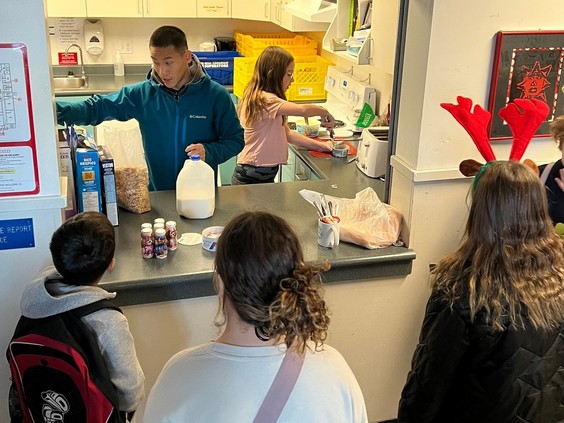“We have a number of families who are struggling with everything,” provider says
It’s on Monday mornings when school opens that the distressing consequences of run-away food and housing costs are most vivid in this small, coastal Vancouver Island town.
These days there’s always a rush of students seeking a free breakfast at Ladysmith Intermediate on French Street.
And for Josh Grossgardt, the school’s child, youth and family support worker, that’s a sure sign that some children and families “haven’t really eaten all weekend.”
The implications of what he’s seeing are disturbing, as is the increase in families seeking help.
“We have a number of families who are struggling with everything, the price of food, housing, things like that. So we get a big rush of students Monday mornings.
“Looking at the cost of food right now, cost of living, cost of gas — you can see it playing out,” he said.
Getting sufficient food to feed them at school is also a struggle.
The school serves breakfast and lunch using food supplied by the Nanaimo-Ladysmith School Foundation, which sends basic items — milk, cereal, bread, some fruit, peanut butter and jam.
Unfortunately, it doesn’t always cover what they need and sometimes they run out, said Grossgardt.
He has applied to The Vancouver Sun’s Adopt-a-School (AAS) program for $3,000 to buy food to supplement what they are presently receiving and to provide a greater variety for what is being offered at breakfast and lunch.
“Right now we are giving students sandwiches for lunch every day, but there’s no protein — ham, or anything like that — in the sandwiches.
“It’s just peanut butter and jam, so we’d like a little more diversity in the food we’re providing so it’s not the same thing every day, every week,” he said.
“And quantity-wise (with an AAS grant) we’d be able to have more food available and not be running out and having to go and get food mid-week.”
The schools’ Parent Advisory Council (PAC) donated $300 in September to buy food.
“It was very generous to start us off — tide us over,” he said.
COVID-19 resulted in more families falling into poverty and this year’s cost of living crisis is devastating families existing on social assistance or low-wage jobs.
And some are not sending their children to school, says Grossgardt.
“I think it has a lot to do with having low income or poor mental health and maybe the stigma of kids showing up at school and not having everything they need.
“So some parents might be more reluctant to send their kids to school.
Maybe they are not clean or they don’t have a backpack or school supplies, but we do our best to take care of stuff like that.”
Grossgardt was asked if providing breakfast and lunch could bring some of these missing children back. “Absolutely,” he said.
This year more schools than ever are seeking help from AAS to feed, clothe and provide for impoverished children arriving at school — many in a distressed condition.
More than $2 million in aid is being sought by hundreds of schools across the province.
By Gerry Bellett (gbellett@gmail.com)
